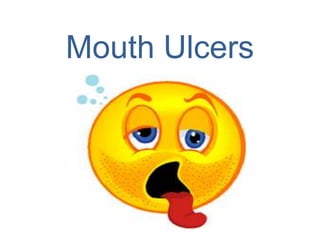
Mouth ulcers
- 1. Mouth Ulcers
- 2. What is Mouth Ulcer? A mouth ulcer is the loss or erosion of part of the delicate tissue that lines the inside of the mouth.
- 3. Symptoms • A round sore or sores inside the mouth • Swollen skin around the sores • Tenderness • Problems with chewing or toothbrushing because of the tenderness • Irritation of the sores by salty, spicy or sour foods • Loss of appetite
- 4. Causes • Accidental biting of the cheek • Injury from a toothbrush (such as slipping while brushing) • Constant rubbing against misaligned or sharp teeth • Constant rubbing against dentures or braces • Poor oral hygiene • Burns from eating hot food • Irritation from strong antiseptics, such as a mouthwash
- 5. Causes • Oral thrush infection • Herpes simplex viral infection (cold sore) • Reaction to certain drugs, such as chemotherapeutic agents • Autoimmune diseases (for example, lichen planus) • Syphilis infection • A range of other infections including hand-foot-mouth syndrome • Certain diseases including tuberculosis, AIDS, diabetes mellitus and inflammatory bowel disease • Cancer of the lip
- 6. Treatment
- 7. Most mouth ulcers are harmless and resolve by themselves in a few days. Other types of mouth ulcers, such as the aphthous variety or those caused by herpes simplex infection, need medical treatment. It isn’t possible to speed the recovery of ulcers, but the symptoms can be managed and the risk of complications reduced.
- 8. Treatment • Avoid spicy and sour foods until the ulcers heal • Drink plenty of fluids • Regularly rinse your mouth out with warm, slightly salted water • Keep your mouth clean
- 9. Treatment • Take pain-killing medication, such as paracetamol • Apply antiseptic gel to the ulcers • Use a medicated mouthwash • Use steroid gels or tablets
- 10. Treatment • Treat aphthous ulcers with anti-inflammatory drugs • Treat ulcers caused by the herpes simplex virus with anti-viral drugs • Treat oral thrush with anti-fungal drugs • Immunosuppressant drugs are sometimes required
- 11. Prevention • Brush your teeth at least twice every day. • Floss regularly. • Visit your dentist regularly. • Brush your teeth very gently, taking care not to slip with the brush.
- 12. Prevention • Eat a well-balanced and nutritious diet. • Make sure that underlying conditions, such as diabetes mellitus and inflammatory bowel disease, are managed appropriately.
- 13. Things to remember • The most common cause is mechanical injury, such as accidentally biting your cheek. • In most cases, mouth ulcers are harmless and resolve by themselves in a few days without the need for medical treatment. • If your mouth ulcers don’t clear up within a few days, or if you are troubled by frequent attacks, see your doctor.